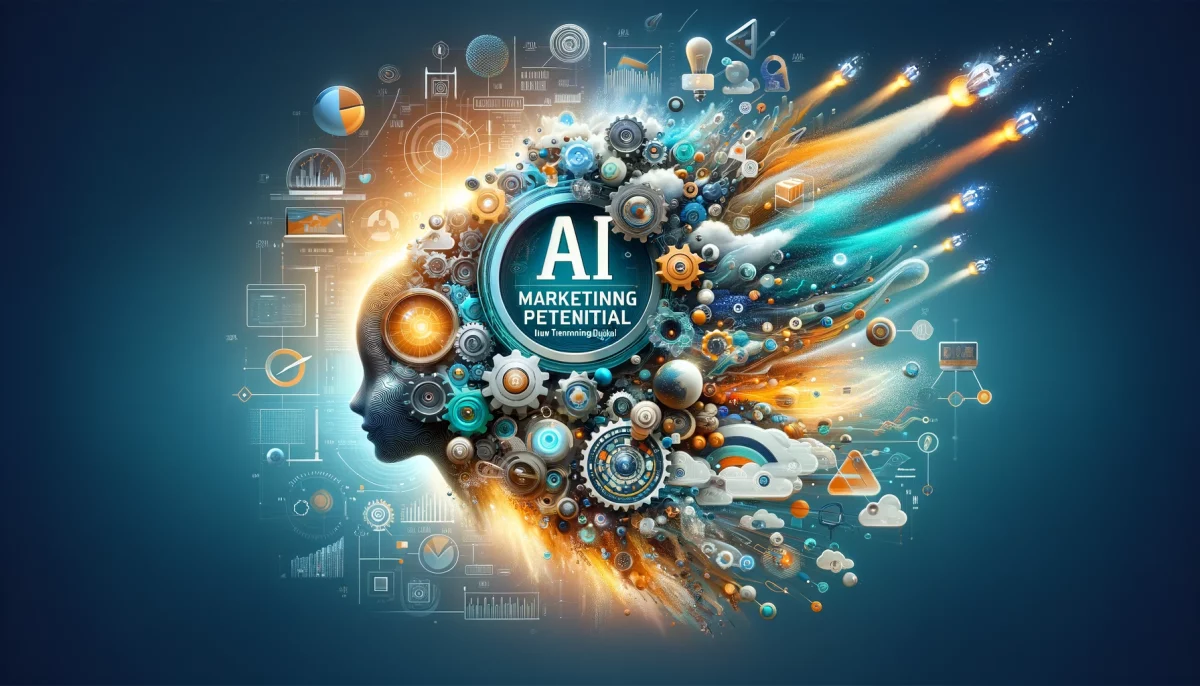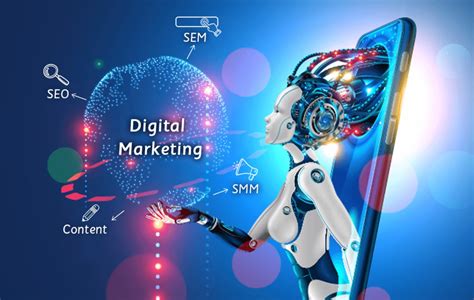Artificial Intelligence (AI) has fundamentally transformed the landscape of digital marketing, opening new horizons for businesses worldwide. By harnessing the power of machine learning, natural language processing, and data analytics, companies are now able to create highly personalized customer experiences, optimize campaigns in real time, and predict market trends with greater accuracy than ever before. This article delves into the myriad ways AI is reshaping digital marketing strategies, explores its benefits and challenges, and provides insights into future trends that will likely continue to redefine the industry.
In today’s rapidly evolving digital ecosystem, traditional marketing methods are no longer sufficient to keep up with the dynamic consumer behavior and competitive pressures. AI-powered tools have become indispensable for digital marketers aiming to maximize their reach and engagement. By automating routine tasks, analyzing vast amounts of data, and enabling hyper-personalized communication, AI not only increases operational efficiency but also drives revenue growth. This comprehensive exploration outlines the revolutionary impact of AI on digital marketing strategies, offering actionable insights and practical examples that illustrate its profound influence on the industry.
The Emergence of AI in Digital Marketing
The integration of AI into digital marketing is not a sudden phenomenon but rather the culmination of years of technological evolution. Historically, marketing campaigns were heavily reliant on manual data analysis and broad segmentation strategies. However, as consumer data grew exponentially, the need for more sophisticated tools became apparent. AI stepped in to fill that gap, enabling marketers to process big data, predict trends, and tailor campaigns on a scale that manual processes could never achieve.
Key drivers behind the adoption of AI in digital marketing include:
A. Data Explosion: The digital age has generated massive amounts of data. AI algorithms can sift through this data to uncover actionable insights.
B. Increased Competition: In a saturated digital space, standing out requires innovative strategies. AI-powered tools allow marketers to target niche audiences and deliver personalized messages.
C. Advancements in Machine Learning: Continuous improvements in machine learning techniques have made it possible to predict consumer behavior with higher precision, allowing for more effective campaign management.
D. Automation: Automation of repetitive tasks such as ad bidding, email marketing, and content curation helps marketers focus on strategic decision-making.
These factors collectively contribute to why businesses are increasingly investing in AI technologies to drive their digital marketing efforts.
AI-Powered SEO Optimization
Search Engine Optimization (SEO) remains a cornerstone of digital marketing, and AI is enhancing this practice in several transformative ways. Traditional SEO practices have relied on keyword research, backlink analysis, and content optimization. With AI, however, these processes are being refined to deliver more targeted results.
Enhanced Keyword Analysis
AI-driven tools can analyze search patterns, user intent, and semantic relationships between keywords to offer more relevant suggestions. Unlike manual keyword research, these tools can process millions of search queries and identify trends that might not be immediately apparent.
Content Quality and Relevance
Modern search engines prioritize content that meets user intent. AI algorithms evaluate the quality of content by examining factors like readability, engagement, and context. This enables marketers to optimize their content to rank higher on search engine results pages (SERPs). Additionally, AI tools can suggest improvements, such as better structuring of articles or more engaging headlines.
Voice Search Optimization
With the increasing use of voice assistants, optimizing for voice search is becoming crucial. AI helps marketers understand natural language queries and adjust their content strategies accordingly. This includes focusing on long-tail keywords and conversational phrases that match the way people speak.
Technical SEO Improvements
AI also plays a significant role in enhancing technical SEO by identifying issues such as broken links, slow page loading speeds, and poor mobile responsiveness. Tools powered by AI can continuously monitor website performance and alert marketers to any problems that could affect search rankings.
Personalized Content and Customer Engagement
Personalization is at the heart of modern marketing. AI technologies have revolutionized how brands interact with customers by offering highly tailored experiences based on individual preferences and behaviors.
Data-Driven Personalization
By analyzing user data such as browsing history, purchase patterns, and social media interactions, AI can segment audiences more precisely than ever before. This enables brands to create personalized content that resonates with each user. For instance, email marketing campaigns can be customized to include product recommendations that reflect a customer’s past behavior, increasing the likelihood of conversion.
Dynamic Content Delivery
AI systems can dynamically adjust website content, advertisements, and product suggestions based on real-time data. This ensures that the marketing message is always relevant to the visitor. Some key features include:
A. Real-Time Adaptation: Websites and apps that change content based on user behavior.
B. Predictive Personalization: AI predicts what content will engage users, tailoring their digital journey accordingly.
C. Automated A/B Testing: Continuous testing of different content variations to identify what works best for different audience segments.
Chatbots and Virtual Assistants
AI-powered chatbots have become a vital component of customer service and engagement. These virtual assistants can handle a wide range of queries, from answering frequently asked questions to guiding users through complex transactions. The conversational capabilities of chatbots have improved dramatically with advances in natural language processing (NLP), allowing them to interact with customers in a more human-like manner.
Social Media Engagement
Social media platforms are fertile ground for AI applications. Marketers use AI to analyze trends, monitor sentiment, and even schedule posts for optimal engagement times. Moreover, AI can identify influential voices within a community, enabling brands to leverage social proof and boost their credibility.
Data-Driven Marketing and Advanced Analytics
One of the most significant benefits of AI in digital marketing is its ability to harness the power of data. By employing advanced analytics, AI systems provide deeper insights into consumer behavior, campaign performance, and market trends.
Predictive Analytics
Predictive analytics involves using historical data to forecast future outcomes. AI algorithms can analyze past performance metrics to predict which marketing strategies are likely to succeed. This proactive approach allows marketers to allocate resources more effectively and mitigate risks associated with campaign investments.
Customer Journey Mapping
Understanding the customer journey is essential for creating effective marketing strategies. AI tools can track and analyze every touchpoint in the customer lifecycle, from initial awareness to final purchase. This holistic view helps marketers identify friction points and optimize each stage of the journey to enhance customer satisfaction.
Real-Time Reporting
The dynamic nature of digital marketing requires real-time data analysis. AI-powered dashboards provide instant insights into campaign performance, enabling marketers to adjust strategies on the fly. These tools can monitor metrics such as click-through rates, conversion rates, and return on investment (ROI) in real time, ensuring that campaigns remain agile and responsive.
Segmentation and Targeting
Effective segmentation is crucial for delivering personalized marketing messages. AI can analyze vast amounts of data to identify distinct audience segments based on behavior, demographics, and preferences. This level of granularity allows marketers to target specific groups with tailored content, resulting in higher engagement and conversion rates.
AI and Automation in Marketing Campaigns
Automation is one of the most celebrated benefits of AI in digital marketing. By automating routine and repetitive tasks, marketers can focus on strategy and creativity, thereby improving overall campaign effectiveness.
Automated Ad Bidding
Digital advertising platforms, such as Google Ads and Facebook Ads, have integrated AI to manage bidding processes automatically. These systems optimize bids in real time, ensuring that advertisers get the best value for their money. The use of AI in ad bidding helps to maximize exposure while minimizing costs.
Email Marketing Automation
Email remains one of the most effective channels for digital marketing. AI enables sophisticated email automation strategies that can tailor content to individual user behavior. For example, AI can determine the optimal time to send emails based on when recipients are most likely to engage, or personalize the email content to reflect the recipient’s interests.
Content Curation and Scheduling
AI tools are increasingly being used for content curation and scheduling. They can analyze trends and audience behavior to suggest the best topics, headlines, and formats for content. Additionally, AI can automate the scheduling of social media posts, ensuring that content is published at peak times for maximum engagement.
Campaign Performance Optimization
Once a campaign is launched, AI continuously monitors its performance and makes data-driven adjustments. This includes tweaking ad copy, reallocating budgets, or even pausing underperforming ads. The continuous optimization process ensures that campaigns remain effective and cost-efficient throughout their duration.
Benefits of Integrating AI into Digital Marketing
The incorporation of AI into digital marketing strategies offers a range of benefits that extend across various aspects of campaign planning and execution. Some of the most significant advantages include:
A. Enhanced Efficiency: Automating routine tasks frees up marketers to focus on strategic decision-making and creative work.
B. Improved Accuracy: Data-driven insights minimize guesswork, enabling more precise targeting and better ROI.
C. Scalability: AI tools can easily scale with growing data volumes and campaign complexity, ensuring sustained performance.
D. Cost Savings: By optimizing ad spend and streamlining operations, AI helps businesses reduce marketing costs while increasing effectiveness.
E. Personalization: AI allows for highly tailored marketing experiences, which drive higher engagement and customer satisfaction.
Challenges and Considerations
Despite its numerous benefits, the integration of AI into digital marketing is not without challenges. Companies must navigate several hurdles to fully capitalize on its potential.
Data Privacy and Security
The use of AI in digital marketing often involves the collection and analysis of large volumes of personal data. This raises important questions about data privacy and security. Businesses must ensure that they comply with regulations such as the General Data Protection Regulation (GDPR) and the California Consumer Privacy Act (CCPA), while also maintaining transparent data practices with their customers.
Ethical Considerations
AI algorithms can sometimes reflect inherent biases present in the data they are trained on. This can lead to unintended discrimination or skewed targeting. Marketers must be mindful of these risks and work towards creating more ethical AI systems that are transparent, fair, and accountable.
Integration with Existing Systems
Implementing AI solutions can be a complex process, particularly for organizations with legacy systems. Ensuring a smooth integration often requires significant investment in technology and human resources. Businesses must plan strategically to align their AI initiatives with existing marketing infrastructures.
Skill Gap and Training
There is a growing need for skilled professionals who can manage and interpret AI-driven tools. As technology evolves, continuous training and upskilling of marketing teams become essential to fully leverage AI capabilities.
Future Trends in AI-Driven Digital Marketing
The future of digital marketing is undoubtedly intertwined with the evolution of AI. As technology continues to advance, we can expect several trends to shape the industry in the coming years.
Hyper-Personalization
The next frontier in digital marketing is hyper-personalization, where AI will not only segment audiences but also create unique content tailored to each individual’s preferences in real time. This goes beyond basic personalization to offer a truly bespoke experience for every customer.
Augmented Reality (AR) and Virtual Reality (VR) Integration
Emerging technologies such as AR and VR are beginning to intersect with AI, creating immersive marketing experiences. For example, virtual showrooms and interactive advertisements can provide customers with a more engaging and memorable experience.
Advanced Predictive Analytics
As AI algorithms become more sophisticated, predictive analytics will play an even larger role in forecasting consumer behavior. This will allow marketers to preempt market shifts and optimize their campaigns before competitors even react.
Greater Emphasis on Conversational Marketing
With the continued advancement of natural language processing, conversational marketing via chatbots and voice assistants is set to become even more integral to customer engagement strategies. Brands will increasingly rely on these tools to build deeper relationships with their audiences.
Integration of AI with Blockchain Technology
Blockchain technology offers increased transparency and security, which can complement AI in digital marketing. Future applications may involve using blockchain to verify data integrity, ensuring that AI-generated insights are both accurate and trustworthy.

Strategic Implementation of AI in Digital Marketing
For businesses looking to implement AI-driven strategies, a structured approach is key. The following framework outlines the steps necessary to successfully integrate AI into digital marketing efforts:
A. Assessment:
- Evaluate current digital marketing practices and identify areas where AI can have the most impact.
- Conduct a comprehensive audit of available data and existing technological capabilities.
B. Goal Setting:
- Define clear, measurable objectives for the integration of AI.
- Ensure alignment with broader business goals and marketing strategies.
C. Tool Selection:
- Research and choose AI-powered tools that match your business needs.
- Consider factors such as ease of integration, scalability, and cost-effectiveness.
D. Implementation:
- Develop a phased rollout plan that allows for testing and iterative improvement.
- Train marketing teams to effectively use new AI tools.
E. Monitoring and Optimization:
- Set up robust analytics to continuously track the performance of AI-driven campaigns.
- Be prepared to adjust strategies based on real-time data and feedback.
Case Studies and Real-World Examples
To understand the practical impact of AI in digital marketing, it is helpful to look at several real-world examples where AI has driven significant improvements:
Case Study 1: E-Commerce Personalization
A leading e-commerce company implemented AI to analyze customer browsing and purchase history. By integrating an AI-powered recommendation engine, the company was able to present personalized product suggestions to users. The results included:
A. Increased Conversion Rates: Tailored recommendations led to a noticeable uplift in sales.
B. Enhanced Customer Satisfaction: Customers appreciated the relevant product suggestions, leading to repeat business.
C. Efficient Inventory Management: The insights from AI allowed the company to optimize stock levels based on predicted demand.
Case Study 2: Dynamic Ad Bidding
A global digital advertising agency adopted AI for automated ad bidding across multiple platforms. By utilizing machine learning algorithms to adjust bids in real time, the agency achieved:
A. Optimized Ad Spend: More efficient allocation of budgets led to reduced costs and increased ad impressions.
B. Improved Targeting: Real-time data analysis enabled the agency to target the right audience segments with precision.
C. Scalable Campaign Management: The automation capabilities allowed for simultaneous management of multiple campaigns across diverse markets.
Case Study 3: Enhanced Customer Service with Chatbots
A multinational telecommunications company introduced an AI-powered chatbot to handle customer inquiries. The implementation resulted in:
A. Faster Response Times: Chatbots provided immediate assistance, significantly reducing wait times.
B. 24/7 Availability: The company was able to offer round-the-clock support, improving overall customer satisfaction.
C. Cost Reduction: Automating routine inquiries allowed human agents to focus on more complex issues, optimizing resource allocation.
Overcoming Common Pitfalls
While the benefits of AI are vast, organizations must also address common challenges to ensure successful implementation. Some of these pitfalls include:
A. Overdependence on Automation:
- Relying too heavily on AI can lead to a loss of the human touch in marketing.
- It is essential to balance automated processes with human oversight.
B. Data Quality Issues:
- The effectiveness of AI algorithms is directly tied to the quality of the input data.
- Investing in robust data collection and cleaning processes is critical for success.
C. Resistance to Change:
- Integrating AI into traditional marketing workflows can meet resistance from teams accustomed to legacy systems.
- Continuous training and clear communication of AI benefits can help overcome this challenge.
D. Privacy Concerns:
- The collection and utilization of customer data must be handled with the utmost care to avoid privacy breaches.
- Adhering to regulatory standards and being transparent with customers is essential.
The Role of AI in Content Creation
Content is king in the digital marketing realm, and AI is playing an increasingly significant role in content creation and curation. Here’s how AI is making a difference:
Automated Content Generation
AI-driven platforms can now generate high-quality content based on given topics and keywords. These tools help marketers by creating drafts that can be further refined by human editors. While the output may require a human touch, the initial creation process is significantly accelerated.
Content Curation and Aggregation
Beyond generating content, AI can also curate relevant articles, blog posts, and research papers from across the web. This capability not only saves time but also ensures that the curated content is tailored to the interests of the target audience. By leveraging natural language processing, AI can summarize long articles into digestible insights, making them more accessible to readers.
Optimizing Content for SEO
AI tools analyze user search patterns and engagement metrics to provide recommendations for optimizing content. These insights include suggestions for keyword density, meta descriptions, and headline structuring—all of which contribute to higher search engine rankings and improved visibility.
How Marketers Can Prepare for an AI-Driven Future
As AI continues to evolve, digital marketers must be proactive in preparing for the future. Adopting AI is not merely a technological upgrade but a fundamental shift in the way marketing strategies are conceived and executed. Here are some strategies to help marketers stay ahead:
A. Continuous Learning and Training:
- Invest in training programs that focus on AI technologies and data analytics.
- Stay updated with the latest trends and tools in the AI domain.
B. Collaboration Across Departments:
- Work closely with IT and data science teams to seamlessly integrate AI into marketing workflows.
- Foster a culture of innovation where ideas for AI application are encouraged.
C. Pilot Projects and Experimentation:
- Start with small-scale pilot projects to test AI tools and measure their impact before a full-scale rollout.
- Use the insights gained to refine strategies and expand AI usage gradually.
D. Ethical Guidelines and Best Practices:
- Develop clear ethical guidelines for the use of AI, ensuring transparency and fairness in all campaigns.
- Regularly review and update these guidelines to keep pace with technological advancements.

The Economic Impact of AI on Digital Marketing
The integration of AI into digital marketing not only transforms marketing practices but also has a significant economic impact on businesses. Companies that effectively leverage AI tend to experience improved financial performance through enhanced efficiency, better targeting, and increased customer loyalty. Key economic benefits include:
A. Revenue Growth:
- Personalized marketing and dynamic ad bidding contribute to higher conversion rates and increased revenue.
- Improved customer engagement drives repeat business and long-term loyalty.
B. Cost Reduction:
- Automation reduces the need for extensive human resources in routine tasks, lowering operational costs.
- Optimized ad spending ensures that marketing budgets are used more efficiently.
C. Market Expansion:
- AI enables companies to tap into new market segments by identifying and targeting untapped audiences.
- Data-driven insights allow for the development of innovative products and services tailored to emerging consumer needs.
Overcoming the Learning Curve
Adopting AI in digital marketing often involves a steep learning curve. However, businesses that invest time and resources into mastering these technologies are likely to see substantial long-term benefits. Key strategies to overcome this learning curve include:
A. Partnering with Experts:
- Collaborate with AI specialists and digital marketing agencies that have experience in implementing AI-driven solutions.
- Leverage their expertise to accelerate the learning process.
B. Investing in Training and Development:
- Provide continuous learning opportunities for marketing teams to keep abreast of AI developments.
- Organize workshops, webinars, and training sessions that focus on practical applications of AI.
C. Implementing Gradual Changes:
- Introduce AI technologies in phases rather than attempting a complete overhaul of existing systems.
- Use pilot programs to test and refine AI applications before scaling up.
Measuring the ROI of AI-Driven Marketing
Measuring the return on investment (ROI) for AI initiatives is crucial for determining their effectiveness. With the right metrics in place, businesses can assess how AI is contributing to overall marketing performance. Important considerations for measuring ROI include:
A. Conversion Metrics:
- Track increases in conversion rates that result from personalized content and dynamic ad strategies.
- Analyze customer acquisition costs and lifetime value to gauge the financial impact.
B. Engagement Levels:
- Monitor improvements in customer engagement, such as time spent on websites, click-through rates, and social media interactions.
- Use sentiment analysis to understand how customers perceive AI-driven interactions.
C. Operational Efficiency:
- Evaluate the reduction in manual labor and associated costs through the automation of marketing tasks.
- Compare campaign performance before and after the integration of AI technologies.
Conclusion
AI is indisputably revolutionizing digital marketing by introducing unprecedented levels of precision, efficiency, and personalization. From SEO optimization and real-time analytics to automated ad bidding and hyper-personalized customer interactions, the influence of AI spans every facet of digital marketing. While challenges such as data privacy, ethical considerations, and integration hurdles remain, the overall benefits far outweigh the drawbacks. As businesses continue to adapt and innovate, AI will undoubtedly play an increasingly central role in shaping marketing strategies and driving economic growth.
In summary, the rise of AI represents a paradigm shift in digital marketing. By embracing these technologies, marketers can not only stay ahead of the competition but also foster deeper connections with their audience. As the technology matures, the possibilities for AI-driven marketing will expand, offering even more sophisticated tools for engaging customers and optimizing campaigns.









